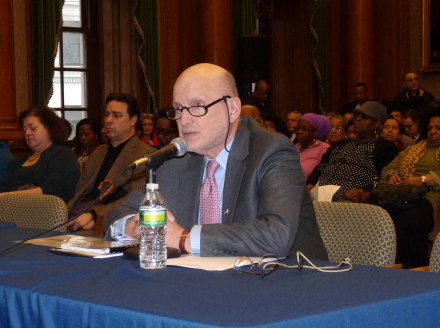After LICH closure vote, hundreds pack Brooklyn Borough Hall for hearing, vow to fight on

stephen_berger_B_by_Mary_Frost0001.jpg
After SUNY voted to close Long Island College Hospital (LICH), an overflow crowd packed Brooklyn Borough Hall’s courtroom for a hearing on the borough’s health care crisis.
An overflow crowd packed Brooklyn Borough Hall’s courtroom Friday morning for a hearing on the borough’s health care crisis, sponsored by the New York State Assembly’s committee on health.
The hearing began just moments after Assemblywoman Joan Millman (D – District 52) confirmed to the doctors and nurses rallying outside that SUNY’s board of trustees had voted that morning to close down Long Island College Hospital (LICH).
